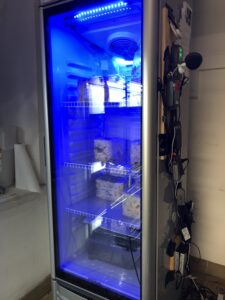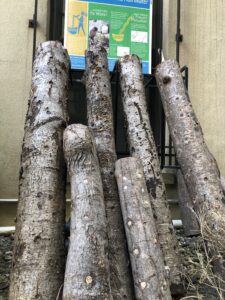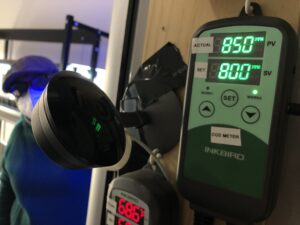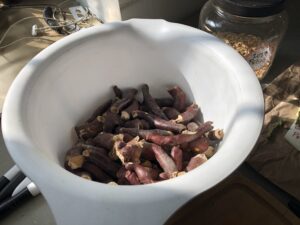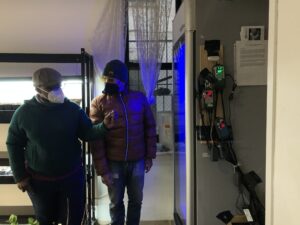Growing Together: Kelly Street Garden’s Community-Centered Approach to Mushroom Cultivation
Bronx-based community garden is a hub for innovation in urban agriculture.
Authors: Sneha Ganguly and Leigh Ollman
On a typical weekday at Kelly Street Garden, you’ll find the members of the mushroom cultivation team – Renee Keitt, Pepper Negron, Sunny Vasquez, and DK Kinard – troubleshooting the retrofitted refrigerator they are using to grow different varieties of Oyster, Shiitake, Lion’s Mane, Pioppino Reishi and other mushrooms. You might find them huddled around a humidity sensor that has been beeping all morning, sharing ideas on how to make the right equipment adjustments. Other times they will be meticulously cleaning the mushroom grow chamber, a routine that helps them cut down on potential contamination by other, ever-present fungi in the environment. More often than not, their task is to harvest the mushrooms they’ve grown to distribute and share with their community. Since the team at Kelly Street Garden received a repurposed refrigerator outfitted with some basic cultivation equipment as part of a Cornell research project about a year ago, they have become well known for creating a community centered approach to mushroom cultivation, education, and training designed specifically for the urban landscape.
Led by Renee’s initiative and participation in Cornell’s Community Mushroom Educator program, the team collaborated with Steve Gabriel, Specialty Mushroom and Agroforestry Specialist at the Cornell Small Farms program to get the mushroom grow chamber up and running. The group meets weekly to manage the grow chamber and harvest mushrooms that they then distribute throughout the Bronx in partnership with other community members. Renee has also introduced other mushroom cultivation techniques at the Kelly Street Garden, including adding a Wine Cap mushroom bed among the garden’s fruit trees, growing Oyster mushrooms using recycled laundry baskets or five gallon buckets, and managing inoculated Shiitake logs as part of the multi-stakeholder Logs to NYC project. Through these and other initiatives, the Kelly Street Garden team has created a safe space where people from across New York City and beyond can come to experiment and engage with each other around the practice of growing food. Renee observes that “Community has to be reimagined. It’s not just people from the block, it’s people coming in here to experience, to learn, to have a respite, to put their hands in the soil…It’s larger than people just who are in that space. It’s people who are willing to come in, collaborate, and interact. Some people come here because they like soil or are scientific and want to do research. Other people come in here, and they’re fascinated that they can grow mushrooms in the Bronx. Why not? You can do anything in the Bronx. Just because people have not done it doesn’t mean it can’t be done.”
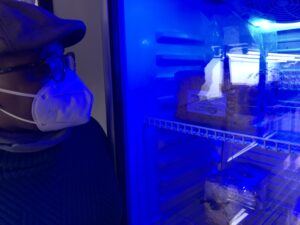
Renee showing the mushrooms growing in the retrofitted refrigerator grow chamber. (Photo Credit: Sneha Ganguly)
Setting up an indoor mushroom chamber at the Garden was a natural next step for these serious and dedicated cultivators to learn how to maximize their urban grow space and extend the growing season to ramp up their ability to produce food year round. “We hadn’t done it,” Renee explains. “It was time to see what would happen indoors. Is this actually something that’s viable as a business? Is it viable at all?… Compared to the things we’ve done outside, what’s the difference? What’s the difference in yield? What’s the difference in quality? Do they look the same? Do they taste the same? All those things you need to know as a grower, you just can’t take that for granted. You have to adapt. It’s kind of what we do. We adapt, we learn, we change. It’s basically how we grow as growers….And this is a rare thing, to have a place where you’re not having to worry about how much electricity is. You don’t get that…This is the way you can experiment and learn to be better and do better. This was a unique opportunity that a lot of people don’t have.”
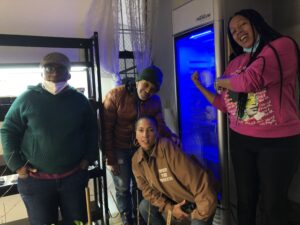
The Kelly Street Garden Mushroom Grow Team with their converted refrigerator grow chamber. From left; Renee Keitt, Pepper Negron, Sunny Vasquez, & DK Kinard (Photo Credit: Sneha Ganguly)
The Kelly Street Garden team embraced working collaboratively in order to learn how to engage with unfamiliar mushrooms and grow chamber technology. DK notes that learning in community and with Community was the key to their success, stating “learning with Sunny, Pepper and Renee I found that it’s more inviting to learn mushrooms together than it is separately because it’s all quite vast and at times, complex.” Each member of the team brought their unique talents and experiences to the project. Over time, and through a series of trial and error, they grew more patient, observant and confident in their abilities. DK reflects “this has been such an experimental process, every week it was just something new and different.” One unexpected outcome of their experimentation was that they are now able to apply what they’ve learned about the mechanics of using a refrigerator to dedicate a portion of the mushroom yield to some of their other food justice projects. DK, who is a community fridge activist, intends to use the technical knowledge gained from the mushroom cultivation to uplift and educate not only the New York City community fridge landscape, but also food distribution efforts across all of her networks of community care activism.
Introducing equipment and technology to an urban growing space is just one aspect of Kelly Street Garden’s approach to serving and educating others. The team has created a variety of different ways for people to engage with fungi with the goal of reaching out to new groups of people who may have had limited interaction with mushrooms in the past. One example of this is the Kelly Street Garden Community Apothecary, where community members, growers, students, and other visitors from many areas of the city can come to gather herbal home remedies, share recipes, exchange experiences with the team, and harvest locally grown food. When the team discovered that their grow chamber was well suited for cultivating Reishi (among other varieties including Chestnut, Blue Oyster and at times even Lion’s Mane mushrooms) they recognized that mushroom’s significant medicinal benefits and began dehydrating the mushroom to add to their extensive community apothecary. DK shares that “a different kind of exchange happens when we are talking about recipes and story sharing. Because, if you have someone like me, who is saying, “I don’t like mushrooms”, you need people who are going to ask, “Have you tried them this way?” You need that when you’re coming in having had a difficult experience or just don’t know. So that’s another layer we have with the apothecary. We now have this opportunity for knowledge exchange, beyond growing and now to the table, which is a big element as well.”
Through their various efforts to provide seeds, food, medicine, educational workshops and other opportunities to share knowledge within the community, the members of Kelly Street Garden have created a trusted respite and welcoming green space for others to experiment with growing food and fungi. DK observes that the team is “very serious about creating an environment of learning and respect. And that’s another reason why people come here, because they know they are safe here and will be taken seriously, regardless of their level of education, or background.” Visitors to Kelly Street Garden are often intrigued by the mushrooms they see growing, which can motivate them to want to learn more. Sunny, who has a newfound appreciation for myco-remediation and medicinals, says working with mushrooms “was a magical experience! It was eye-opening! It was expansive!…I always share on social media what we are growing and what we are doing, and people will be like ‘What?! You got mushrooms in the Bronx, in a chamber?!” Building confidence among beginner growers who may be interested in experimenting with new mushroom cultivation techniques, especially within Black and Latinx communities, is an important element of their work. Renee shares that “Representation matters. Seeing people who look like yourself [grow mushrooms] is important. But, knowing that you can do it, is important. You have to find the low tech solutions and then you grow from there. You can make your mistakes, you’re going to fail, and then you’re going to eventually get the hang of it.”
By using materials they have on-hand and working within limited space and constraints, the Kelly Street Garden’s mushroom grow team is expanding our imagination of what’s possible. However, the project is not without its challenges. For example, sourcing the necessary tech and labor to retrofit the refrigerator, time, electricity charges, and other related costs can be prohibitive for anyone thinking of growing mushrooms indoors. Many Community Gardens will need to identify funding sources if they are considering undertaking such an endeavor. Managing a mushroom grow chamber and mastering the set-up and use of related technologies does require a dedicated team willing to contribute several hours each week to clean, adjust and navigate learning and growing in the ever-changing fungi landscape. There are also the physical, environmental and logistical requirements of bringing the equipment into the typically confined setting of urban spaces and gardens to consider. The Kelly Street Garden team has some entertaining stories to share about how they had to maneuver the refrigerator down a flight of stairs, through a narrow doorway, and into a modified closet, in order to set it up. Pepper recalls that when they were installing the refrigerator “we literally took apart the closet, took the doors and shelves down, just to slide it in there. We had to give it a perfect spot!”
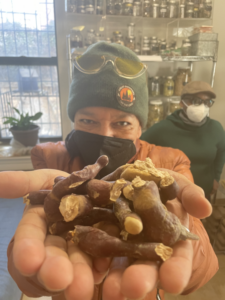
Pepper holding dried Reishi (Photo Credits: Leigh Ollman and Sneha Ganguly)
Despite the many challenges of urban farming, Kelly Street Garden’s commitment to exploring new ways to cultivate and distribute food demonstrates how Community Gardens can have a major impact on local food networks. The innovative solutions that are being developed in communities like the Bronx are proof that homegrown food and community care initiatives are not only possible, but are already serving as a critical force in advancing the overall health and well-being of the communities they serve. The knowledge gained is also critically important to advance our collective understanding of the resources needed to create and sustain thriving centers of urban agriculture.
Kelly Street Garden Fridge User Guide : https://cornellsmallfarms.com/3NgozGK


